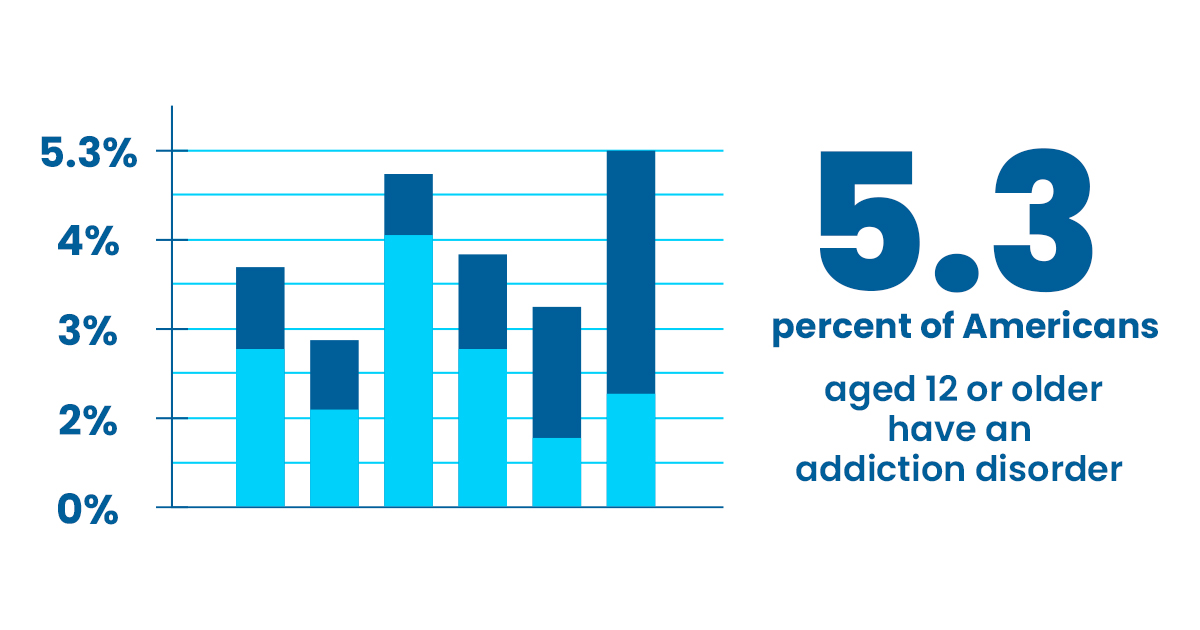Addiction can affect every single person in a family, not just that individual who is fighting with substance or drug abuse.
It is challenging to take the focus off of the addict when you have a family member who struggles with alcohol addiction, whether they are in denial about it in a treatment program or well into the recovery process. But that is what is required to occur for you and your loved ones to drive ahead.
In this detailed article, we come to discuss how families can cope with addiction.
Key Takeaways
Despite the negative consequences, addicts routinely consume harmful substances or partake in compulsive behaviors. Strategies for treating and preventing addiction are more successful than those for other chronic conditions.
- Millions of individuals are battling addiction and substance abuse.
- You can guide your family member on coping with addiction by understanding the addiction and going to family therapy.
- Connect with peer groups through different programs to support loved ones with addiction.
Addiction is a medical disorder that can be treated. The Haven Detox-New England can facilitate your recovery.
Addiction: What is it?
Addiction is a chronic disease that involves intricate connections between a person’s environment, genetic makeup, and brain circuitry. Addicts frequently use drugs or engage in compulsive activities despite the adverse effects.
Addiction prevention and treatment strategies are more effective than for other chronic disorders.
How Addiction Develops
Addiction development can be a complicated process. There is typically no issue at the start. As time passes, individuals may concentrate more on their use (such as drugs, gambling, and alcohol) than they accomplish in other elements of their lives.
They may drop behind on bills or ignore the obligations they hold. Various things can affect the procedure, including an individual’s culture, relationships with friends and families, genetics, and mental health.

How Addiction Affects the Entire Family
The whole family typically develops different ways to cope with the problems caused by addiction. There is often minor communication: the family does not show how they feel or even talk about it.
They keep the addiction a secret from other family members or friends. A few family members may take on the responsibilities the addicted individual has stopped doing or assist with additional financial support to the member with a habit.
While these different ways to cope may assist the family in functioning more smoothly and getting along nicely, they may also allow the addiction to continue. Family members, unfortunately, use drugs, alcohol, and gambling as a way of coping with the issues in the family.
An individual’s addiction usually has a negative effect that can create friction and fighting between family members. Family members can become overwhelmed, worried, or anxious when dealing with the individual user, which can negatively impact their health.
Members often feel lonely, guilty, afraid, ashamed, angry, or frustrated. Members also feel that the situation is hopeless. They need to understand that gambling or substance abuse is not their fault.
Encountering outside help from a religious leader or support group counselor often helps them to manage what and how their family is faring.
Helpful Tips for Families Coping with Addiction
Addiction can occur to anyone, even in loving and capable families. When an addiction grows, friends and family members are directly influenced by the addiction.
Understand Addiction
Families will stop playing the blame game with education. It might be helpful to realize that the person’s addiction is genuinely caused by brain changes instead of thinking that it results from their frailty, stubbornness, or willpower.
You could find it easier to let go of any resentment or anger you may be experiencing toward your loved one’s addiction if you realize addiction is not a choice.
It’s the sort of knowledge that can assist in boosting a family’s hope.
Drive Expectations Accordingly
The hope that everyone experiences when an individual joins addiction treatment can be thrilling. The addiction problem is now being addressed. Things will finally improve.
Managing your expectations for family members is crucial. Relationships require time and work to mend. Early recovery families can still have fun together and busily sustain one another while making errors and not being their best selves.
Even if things aren’t “perfect,” working together to lead drug-free lives can make things more meaningful even when they’re not.
Regular Exercise
Dopamine and oxytocin are the pleasure chemicals released by stretching and pulling tendons and muscles in the brain. High-intensity workouts can assist families in letting out their anxiety and tension in healthy ways that don’t hurt others or leave permanent scars.
They can run rather than yell. They can practice yoga rather than pacing. It’s a great approach to keep your healing on track, and getting started is not too difficult.
Connect With Peer Groups
Connecting with peer groups can help, especially if families use well-established, authorized programs like Alateen or Al-Anon Family Groups. The main objective of these authorized programs is to help families of those living with addiction.
Find Personal Joy
It’s simpler to manage expectations when people are in charge of their happiness. It implies that every family member going through recovery needs to set aside some time for enjoyable activities.
It might comprise of:
- Using a musical instrument
- Taking pictures of nature
- Animal-related volunteer work
- Having fun with kids
- Gardening
- Crafting
- Cooking
You Are Not Alone
Many families in the United States (US) have members using or trying to reduce drug addiction. If you are a child, partner, parent, or carer of someone who uses drugs or has a habit of addiction, you may feel alone, worried, and frustrated.
It is essential to recognize this and get the initial support and help as soon as possible because neglecting this can cause severe problems. Get help, SMART Recovery, support loved ones, and put yourself in a better position to stay sober.
Frequently Asked Questions (FAQs)
What can families do to cope with a loved one’s addiction?
There are various things you can accomplish to support someone you love if they are struggling with addiction:
- In a kind tone, express your concerns about your loved one’s issue.
- Find the resources and people who can help you. Try to maintain optimism and remember that you are not alone. You can get helpful assistance in your neighborhood.
- Don’t lie to your loved one to shield them from the repercussions of using the substance that is the source of their addiction.
- Avoid putting yourself under challenging circumstances. Locate a friend you may call for help.
What are the four levels of addiction?
Regardless of how long your journey is, there are four levels of drug dependence: physical, spiritual, emotional, and mental.
These four levels include individuals who use drugs or participate in dangerous behavior and don’t develop an addiction. People who start taking a substance are likely to create a physical dependence on it.
How do you deal with someone who has an addiction?
Consider the following advice to deal with who has an addiction if you live with the one who is addicted:
- Keep your family members secure.
- Have a strategy in place in case things get out of control.
- Restrict access to money.
- Set up limits for your house.
- Encourage therapy.
- Give yourself a high priority.
- Participate in a support group.
It might result in violence, negativity, and even emotional difficulty to be intimate with an addicted partner. By weakening trust and putting strain on the connection between the partners, substance use disorder can end up ruining the relationship.
The Haven Detox-New England: Here for You
Addiction treatment may provide the break you require to achieve harmony in life. Your treatment will help you stay sober but may also equip you with coping mechanisms for relaxation and stability, improving your quality of life.
The Haven Detox-New England provides a comprehensive range of behavioral therapies, family therapy, and detoxification programs for people who require assistance overcoming their addiction.
We would be pleased to go through all your available treatment choices and create a unique addiction treatment plan and family therapy programs, particularly if you have a lengthy record of addiction and a co-occurring mental health problem.
Don’t allow addiction to have a lasting impact on your life and general well-being.
Call us at (844)933-4145 immediately to learn more about support services, admission programs, and our different addiction treatment options.




